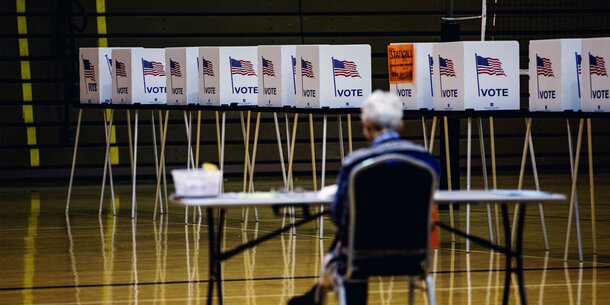Washington was the second state after California to pass its own voting rights act to provide voters of color recourse against discrimination in local elections in state court under state law. Principally, the Washington Voting Rights Act (WVRA) prohibits the use of systems, particularly at-large election systems, that deny minority voters an equal opportunity to elect candidates of choice to local offices such as county commissions, city councils, and school boards, and other local governments.
Two years ago, Latino voters and a Latino-led organization sued Franklin County under the WVRA to challenge the county’s at-large election system. Plaintiffs argued that this system, which required all commissioners to run county-wide rather than from districts, shut Latino voters out of local politics. Because white voters in Franklin County form an electoral majority and have consistently opposed Latino-preferred candidates, Franklin County’s election system denied equal electoral opportunities to Latino voters. So much so that, according to plaintiffs, Latino voters have been unable to elect a single candidate to the county commission over the past 20 years despite constituting more than 50 percent of the county’s overall population and 34 percent of the vote-eligible population.
A Franklin County resident opposing the suit intervened and challenged the legality of the WVRA . The trial court rejected intervenor’s arguments and later approved a settlement reached by plaintiffs and Franklin County. Under the settlement terms, the county will implement single-member districts that will, for the first time, give Latino voters in Franklin County a pathway to electoral success.
Intervenor then filed a direct appeal to the Washington Supreme Court, expanding on his prior claims. He now argues that the plaintiffs do not have standing to bring suit, that the Washington legislature impliedly repealed the WVRA, that the WVRA violates the Washington Constitution’s Privileges and Immunities Clause, and that the WVRA’s failure to incorporate a geographic compactness analysis (which measures the geographic distribution of minority voters within a jurisdiction) runs afoul of the U.S. Constitution’s Equal Protection Clause. In November 2022 the Washington Supreme Court accepted review.
On March 27, 2023, the Brennan Center and pro-bono counsel from Paul Hastings filed an amicus brief in support of plaintiffs arguing that the WVRA readily withstands intervenor’s challenge under the U.S. Constitution.
The brief explains that the WVRA uses a well calibrated test and factors similar to those employed by federal courts to identify discriminatory election systems under the federal Voting Rights Act — inquiries that are necessarily locality-specific and do not lend themselves to mechanical application or predetermined outcomes.
The brief also situates the federal VRA’s geographic compactness requirement as one that is rooted in federal courts’ strong presumption in favor of district-based solutions and federal constitutional limitations on what cases federal courts can hear — considerations that do not apply to Washington courts or WVRA claims. In fact, as the brief argues, the Washington legislature explicitly provided Washington courts with a broad range of solutions for discriminatory election systems beyond district-based remedies, including ones that do not involve drawing districts and thus do not require a consideration of compactness at all.
The Washington Supreme Court will hear oral argument on May 11, 2023.
Documents
Washington Supreme Court
Statement of Grounds for Direct Review (June 17, 2022)
Answer to Statement of Grounds for Direct Review (July 11, 2022)
Appellant’s Brief (July 28, 2022)
Respondents’ Brief (September 12, 2022)
Appellant’s Reply Brief (December 22, 2022)
State of Washington’s Amicus Brief Supporting Respondents (March 27, 2023)
Fred T. Korematstu Center for Law and Equality and ACLU’s Amicus Brief Supporting Respondents (March 27, 2023)
OneAmerica and Campaign Legal Center’s Amicus Brief Supporting Respondents (March 27, 2023)
Law School Civil Rights Clinics’ Amicus Brief Supporting Respondents
(March 27, 2023)
Franklin County Superior Court
Amended Complaint (May 5, 2021)
Intervenor Motion for Judgement on Pleadings (November 10, 2021)
Campaign Legal Center’s Amicus Response to Motion for Judgement on Pleadings (December 2, 2021)
Washington Superior Court Order Denying Motion for Judgement on Pleadings (January 3, 2022)
Order Approving Settlement (May 9, 2022)

